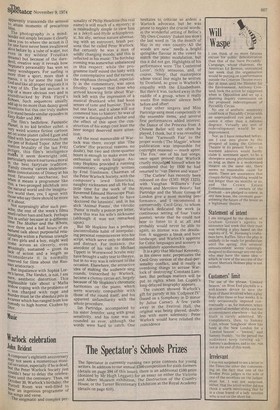Warlock celebration John Brideut 4 ,„ composer's eightieth anniversary 4 "ay not
seem a momentous musical occasion, especially if he is dead, but the Peter Warlock Society just couldn't bear to delay the celebrations until the centenary. Thus, on October 30, Warlock's birthday, the ,f)lifcell Room was well-filled to nhe. ar an ingenious programme of
is songs and verse.
The enigmatic and complex per
sonality of Philip Heseltine (his real name) is still much of a mystery; it is misleadingly simple to view him as a Jekyll-and-Hyde schizophrenic, his shy, serious nature alternating with an extrovert, brash persona that he called Peter Warlock. But certainly he was a man of wildly changing moods, and this is reflected in his music. The birthday evening was somewhat unbalanced in this respect: while the programme itself mixed the lusty with the contemplative and the earnest, the emphasis throughout, especially in the commentary, was upon frivolity. I suspect that those who arrived knowing little about War-. lock left with the impression of a musical drunkard who had keen senses of tune and humbur. This is but one facet, and it alone will not commend him to history; he was of course a distinguished scholar and the effect of this upon the construction of his songs (not least the beer songs) deserved more attention.
All the most memorable of Warlock was there, except alas 'The Curlew' (for practical reasons, no doubt), but two and three-quarter hours is enough to make even the enthusiast wilt with fatigue. Antony Hopkins provided a running commentary, engagingly written by Fred Tomlinson, Chairman of the Peter Warlock Society, with the composer's lewd limericks, naughty nicknames and all. He had little time for the work of the Reverend Edmund Horoscope Phallus, whom he reckoned to have 'doctored the lutenists', and, in his slick 'Animal Poems', the vitriolic 'Puma' is really a poison pen letter, since this was his wife's nickname (although it was not remarked upon), But Mr Hopkins has a perhaps Uncontrollable habit of interpolating personal reminiscences into his script, which serve only to distend and distract. For instance, the anecdote of his visit to Michael Tippett in Wormwood Scrubs may have brought a salty tear to the eye, but in no way was it relevant to the occasion. Elsewhere, the attractive idea of making the audience sing rounds, transcribed by Warlock, became a clumsy circus-act, largely because of Mr Hopkins's chromatic harmonies on the piano, which were scarcely compatible with those of the round itself, and his apparent unfamiliarity with the whole procedure.
Ian Partridge, accompanied by his sister Jennifer, sang with great sensitivity, and his tone was as rounded as ever, although the words were hard to catch. One hesitates to criticise so ardent a Warlock advocate, but he was prone to neglect the crucial words: in the wonderful setting of Belloc's 'My Own Country' (taken too slow) the last word in "In the month of May in my own country/All the woods are new" needs a bright springlike flavour in the vowel to match the piano modulation, but this it did not get. Highlights of his performance were 'The Contented Lover', richly sensuous, and, of course, 'Sleep', that masterpiece whose vocal line might be written by Dowland, so great is Warlock's empathy with the Elizabethans. But there it was, tucked away in the middle of a group, when it really wants five minutes' silence both before and after!
Four other singers and Miss Partridge sang most competently in the ensemble items, and several first performances added interest: the Dance of the Princess from A Chinese Ballet will not often be played, I think, but it was revealing to hear 'Yarmouth Fair' to the proper words (`The Magpie', whose publication was impossible for copyright reasons) — much apter. 'The Fox,' one of his last songs, once again proved that Warlock cruelly misjudged himself when he considered that by 1930 he had returned to "van Dieren and water."
The Curlew' has recently been released on disc (EMI: HQS 1325), with Vaughan Williams's Four Hymns and Merciless Beauty. Ian Partridge and the Music Groupof London give a most moving performance, and I recommend it unreservedly. Cecil Gray, to whom Warlock dedicated the work (a continuous setting of four Yeats poems), wrote that he could not bear -to listen to it at .all and probably would never be able to again, so intense was the desolation. It suggests a bleak and bare landscape, and Warlock's appetite for Celtic languages and scenery is immediately apprehensible. It is a pity that Michael Kennedy, in his sleeve note, perpetuates the Cecil Gray version of the dual-personality conflict, and it really is overdoing things to accuse Warlock of `destroying' Constant Lambert. But perhaps matters will be put to rights when Ian Copley's long-delayed biography appears. The concert showed Warlock's gift for parody in his 'Codpiece IV' (based on a Symphony in D minor by Julius Caesar). A few yards away in the Festival Hall, the original was being played, doubtless with more solemnity. Peter Warlock would have relished the coincidence


































 Previous page
Previous page